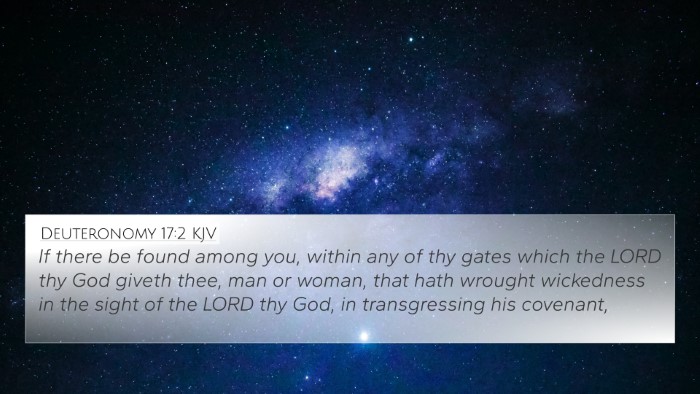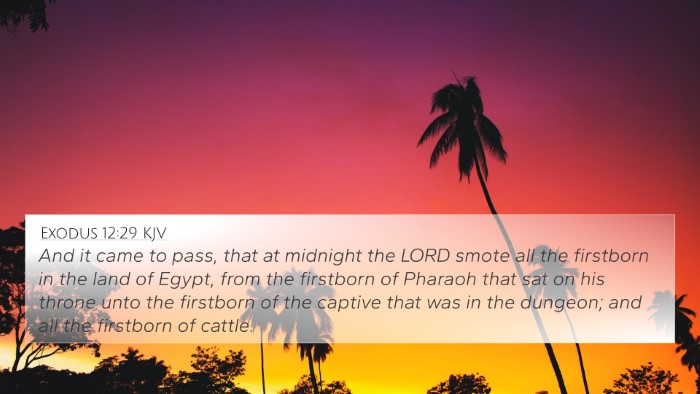Understanding 2 Chronicles 15:13
Verse Reference: 2 Chronicles 15:13: "That whosoever would not seek the LORD God of Israel should be put to death, whether small or great, whether man or woman."
Summary of Meaning
This verse underscores the serious obligation to seek the Lord, emphasizing that those who neglect this duty face dire consequences. The passage reflects the covenantal relationship between God and His people, portraying the need for devotion and fidelity to God as paramount for community and individual identity in Israel. Different commentaries offer insights that align with this perspective.
Commentary Insights
- Matthew Henry: Henry notes that this command reflects the seriousness of worship in the community of Israel. He draws attention to the extent to which the people were called to seek the Lord, indicating a move away from idolatry and disobedience towards a communal pursuit of God's presence.
- Albert Barnes: Barnes focuses on the implications of seeking the Lord with sincerity. He reflects on the societal implications of the decree, suggesting that it served as a deterrent against spiritual apathy and apostasy. The threats, he argues, aim to promote a culture of reverence and devotion.
- Adam Clarke: Clarke emphasizes the dire consequences of neglecting God's commandments. He highlights that such a command aimed to protect the spiritual health of the nation and to preserve the covenant made by their forefathers. This illustrates the gravity associated with forsaking one's devotion to God were crucial for the wellbeing of both individuals and society.
Cross-References
Scripture is rich with verses that echo the themes found in 2 Chronicles 15:13. Here are several cross-references that enhance its interpretation:
- Deuteronomy 28:15: Warns against the consequences of disobedience to God.
- Joshua 24:14-15: Calls for the people to choose whom they will serve, presenting an ultimatum to pursue either God or other gods.
- 2 Chronicles 19:2: Discusses the importance of seeking God to avoid judgment.
- 1 Chronicles 28:9: God commands Solomon to serve Him with a whole heart, emphasizing personal devotion.
- Isaiah 65:11: Speaks about forsaking the Lord and facing the consequences, resonating with the theme of accountability.
- Hosea 4:6: Highlights the perils of lacking knowledge of God, pointing to the necessity of seeking Him.
- Luke 19:10: Refers to Jesus' mission to seek the lost, tying into the importance of seeking God's face.
- James 4:8: Encourages believers to draw near to God, affirming personal engagement with the divine.
- 1 Peter 4:17: Reflects on judgment beginning at the house of God, echoing the caution given in 2 Chronicles.
- Matthew 7:7: Jesus teaches that seeking results in finding, reinforcing the positive outcomes of seeking God.
Thematic Connections
Connecting the themes of 2 Chronicles 15:13 with other biblical texts allows for a deeper understanding of God's expectations for His people and the serious nature of their covenant with Him. It encourages a reflective approach to discipleship and community worship.
Key Themes
- Obedience: The verse implies that disobedience comes with significant consequences, aligning with the overarching biblical theme found in many scriptures.
- Community Worship: The emphasis on a collective effort to seek God highlights the importance of community in faith.
- Divine Judgment: Reinforces the biblical principle that neglecting one's relationship with God invites divine scrutiny and judgment.
- Personal Responsibility: Each individual is held accountable for their actions, echoing other scriptural teachings about faith and personal conviction.
Conclusion
The message of 2 Chronicles 15:13 serves as a powerful reminder of the importance of seeking the Lord. Through integrating insights from various public domain commentaries and related scripture verses, one finds a rich tapestry of understanding that emphasizes personal and communal devotion as essential to faith. For those studying the Bible, this approach to cross-referencing can be a valuable tool in discovering inter-Biblical dialogue and enhancing one's spiritual comprehension.
Using Cross-References: For those interested in exploring more about how to use Bible cross-references, resources such as a Bible concordance or a Bible cross-reference guide can be immensely beneficial. They enable a detailed analysis and understanding of how various scriptures relate to each other, thereby enriching one's study of the Bible.















